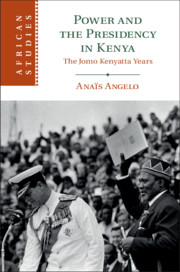Book contents
- Power and the Presidency in Kenya
- African Studies Series
- Power and the Presidency in Kenya
- Copyright page
- Dedication
- Contents
- Acknowledgments
- Introduction
- 1 Kenyatta’s Stateless Political Imagination
- 2 From Prison to Party Leader, an Ambiguous Ascension (1958–1961)
- 3 Kenyatta, Land, and Decolonization (1961–1963)
- 4 Independence and the Making of a President (1963–1964)
- 5 Kenyatta, Meru Politics, and the Last Mau Mau (1961/3–1965)
- 6 Taming Oppositions: Kenyatta’s “Secluded” Politics (1964–1966)
- 7 Ruling over a Divided Political Family (1965–1969)
- 8 “Kenyatta Simply Will Not Contemplate His Own Death” (1970–1978)
- Conclusion
- Sources
- Bibliography
- Index
- African Studies Series
6 - Taming Oppositions: Kenyatta’s “Secluded” Politics (1964–1966)
Published online by Cambridge University Press: 11 October 2019
- Power and the Presidency in Kenya
- African Studies Series
- Power and the Presidency in Kenya
- Copyright page
- Dedication
- Contents
- Acknowledgments
- Introduction
- 1 Kenyatta’s Stateless Political Imagination
- 2 From Prison to Party Leader, an Ambiguous Ascension (1958–1961)
- 3 Kenyatta, Land, and Decolonization (1961–1963)
- 4 Independence and the Making of a President (1963–1964)
- 5 Kenyatta, Meru Politics, and the Last Mau Mau (1961/3–1965)
- 6 Taming Oppositions: Kenyatta’s “Secluded” Politics (1964–1966)
- 7 Ruling over a Divided Political Family (1965–1969)
- 8 “Kenyatta Simply Will Not Contemplate His Own Death” (1970–1978)
- Conclusion
- Sources
- Bibliography
- Index
- African Studies Series
Summary
Chapter 6 investigates how Kenyatta established an institutional order that kept his political authority insulated from potential challengers. It argues that by controlling the funds and distribution of land resources, Kenyatta successfully isolated competing political actors and institutions, thus preventing various political grievances to spill over into his government. The chapter first highlights the continuity between colonial and post-colonial land politics, but also emphasizes the Kenyan government’s agency in facilitating land accumulation by the elite. Exploring land files from the British and Kenyan National Archives, it shows that Kenyatta had concerns about certain sensitive land settlement schemes, but preferred to secure political order by marginal and well-timed adjustments, instead of profound reforms to change colonial economic structures. The chapter then shows how the quasi-limitless presidential powers established an institutional imbalance, which Kenyatta cultivated very carefully, sparsely meting out personal promises and favours. The competition between parliament and civil administration shows how Kenyatta used informal, yet far-reaching powers to prevent both institutions from escaping his presidential authority, all while remaining unexposed. This subtle imbalance may also explain why the landless and poor remained locked into kafkaesque bureaucratic procedures.
Keywords
- Type
- Chapter
- Information
- Power and the Presidency in KenyaThe Jomo Kenyatta Years, pp. 179 - 218Publisher: Cambridge University PressPrint publication year: 2019



